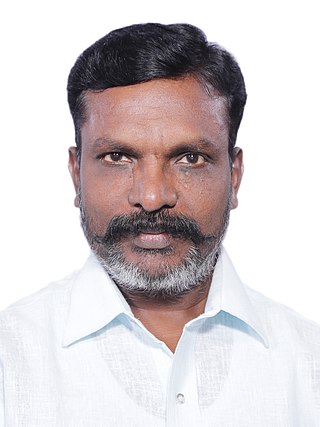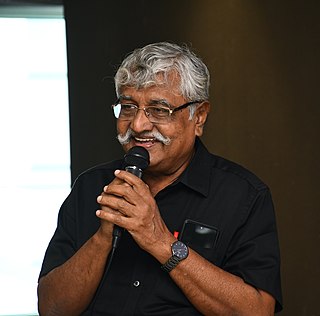Related Research Articles

The Dravida Munnetra Kazhagam is an Indian political party based in the state of Tamil Nadu, where it is currently the ruling party, and the union territory of Puducherry, where it is currently the main opposition.

Velupillai Prabhakaran was a Tamil revolutionary. Prabhakaran was a major figure of Tamil nationalism, and the founder and leader of the Liberation Tigers of Tamil Eelam (LTTE). The LTTE was a militant organization that sought to create an independent Tamil state in the north and east of Sri Lanka in reaction to the oppression of the country's Tamil population by the Sri Lankan government. Under his direction, the LTTE undertook a military campaign against the Sri Lankan government for more than 25 years.

Muthuvel Karunanidhi was an Indian writer and politician who served as Chief Minister of Tamil Nadu for almost two decades over five terms between 1969 and 2011. He is popularly referred to as Kalaignar (Artist) and Mutthamizh Arignar for his contributions to Tamil literature. He had the longest intermittent tenure as Chief Minister of Tamil Nadu with 6,863 days in office. He was also a long-standing leader of the Dravidian movement and ten-time president of the Dravida Munnetra Kazhagam political party. Karunanidhi has the record of never losing an election to the Tamil Nadu Assembly, having won 13 times since his first victory in 1957. Before entering politics, he worked in the Tamil film industry as a screenwriter. He also made contributions to Tamil literature, having written stories, plays, novels, and a multiple-volume memoir. Karunanidhi died on 7 August 2018 at Kauvery Hospital in Chennai after a series of prolonged, age-related illnesses.
The Indo-Sri Lanka Peace Accord was an accord signed in Colombo on 29 July 1987, between Indian Prime Minister Rajiv Gandhi and Sri Lankan President J. R. Jayewardene. The accord was expected to resolve the Sri Lankan Civil War by enabling the thirteenth Amendment to the Constitution of Sri Lanka and the Provincial Councils Act of 1987. Under the terms of the agreement, Colombo agreed to a devolution of power to the provinces, the Sri Lankan troops were to be withdrawn to their barracks in the north and the Tamil rebels were to surrender their arms.

Indian Peace Keeping Force (IPKF) It was the Indian military contingent performing a peacekeeping operation in Sri Lanka between 1987 and 1990. It was formed under the mandate of the 1987 Indo-Sri Lankan Accord that aimed to end the Sri Lankan Civil War between Sri Lankan Tamil militant groups such as the Liberation Tigers of Tamil Eelam (LTTE) and the Sri Lankan military.

Dravidar Kazhagam is a social movement founded by E. V. Ramasamy. Its original goals were to eradicate the ills of the existing caste and class system including untouchability and on a grander scale to obtain a "Dravida Nadu" from the Madras Presidency. Dravidar Kazhagam would in turn give birth to many other political parties, including Dravida Munnetra Kazhagam and later the All India Anna Dravida Munnetra Kazhagam.

Viduthalai Chiruthaigal Katchi, formerly known as the Dalit Panthers of India or the Dalit Panthers Iyyakkam, is an Indian social movement and political party that seeks to combat caste based discrimination, active in the state of Tamil Nadu. The party also has a strong emphasis on Tamil nationalism. Its chairman is Thol. Thirumavalavan, a lawyer from Chennai, and its general secretary is the writer Ravikumar.

Shanmugalingam Sivashankar was a Sri Lankan Tamil rebel and leading member of the Liberation Tigers of Tamil Eelam, a separatist Tamil militant organisation in Sri Lanka.

Tholkappiyan Thirumavalavan, better known as Thol. Thirumavalavan is a political leader, scholar and activist from the southern Indian state of Tamil Nadu. He is a Member of Parliament from Chidambaram. Leader and President of Viduthalai Chiruthaigal Katchi. He rose to prominence in the 1990s as a bahujan leader, and formally entered politics in 1999. His political platform centres on ending caste-based discrimination and consequently the caste system. He has also expressed support for Tamil nationalist movements in Sri Lanka.
Dravidian parties include an array of regional political parties in the state of Tamil Nadu, India, which trace their origins and ideologies either directly or indirectly to the Justice Party and the Dravidian movement of C. Natesanar and Periyar E. V. Ramasamy. The Dravidian movement was based on the linguistic divide in India, where most of the Northern Indian, Eastern Indian and Western Indian languages are classified as Indo-Aryan, whereas the South Indian languages are classified as Dravidian. Dravidian politics has developed by associating itself to the Dravidian community. The original goal of Dravidian politics was to achieve social equality, but it later championed the cause of ending the domination of North India over the politics and economy of the South Indian province known as Madras Presidency.

Tamil nationalism is the ideology which asserts that the Tamil people constitute a nation and promotes the cultural unity of Tamil people. Tamil nationalism is primarily a secular nationalism, that focus on language and homeland. It expresses itself in the form of linguistic purism, linguistic nationalism, Social equality and Tamil Renaissance.

Erode Venkatappa Ramasamy, revered by his followers as Periyar or Thanthai Periyar, was an Indian social activist and politician who started the Self-Respect Movement and Dravidar Kazhagam. He is known as the 'Father of the Dravidian movement'. He rebelled against Brahmin dominance and gender and caste inequality in Tamil Nadu. Since 2021, the Indian state of Tamil Nadu celebrates his birth anniversary as 'Social Justice Day'.
Kumar Muthukumar was an Indian journalist and activist based in the state of Tamil Nadu, who came into prominence when he self-immolated protesting against the brutal atrocities against the Sri Lankan Tamil people at the peak of civil war in the country. His death instantly triggered widespread strikes, demonstrations and public unrest in the state, most notably the manifestation of popular defiance of the Government of India ban against the Liberation Tigers of Tamil Eelam, which the people demonstrated carrying flags of Tamil Eelam, placards and images of the LTTE leader V. Prabhakaran in the funeral procession of Muthukumar. Subsequently, 6 more Tamils committed self-immolation in various parts of the globe including India, Malaysia and Switzerland.
S. Natarajan Udayar was an Indian politician and 3 time DMK MLA from Thanjavur Constituency. A close friend and supporter of Periyar E.V. Ramaswamy, he was an early member of Dravidar Kazhagam. His association with Aringar C N Annadurai made him part ways with E.V.R. politically and join Dravida Munnetra Kazhagam (DMK) as one of the earliest and founding members of DMK.
The Indian intervention in the Sri Lankan civil war was the deployment of the Indian Peace Keeping Force in Sri Lanka intended to perform a peacekeeping role. The deployment followed the Indo-Sri Lankan Accord between India and Sri Lanka of 1987 which was intended to end the Sri Lankan civil war between separatist Sri Lankan Tamil nationalists, principally the Liberation Tigers of Tamil Eelam (LTTE), and the Sri Lankan Military.
The Liberation Tigers of Tamil Eelam (LTTE), a separatist militant organization formerly based in northern Sri Lanka, had various organizations affiliated to it. These include charitable organizations, political parties, state intelligence organizations and even governments of Sri Lanka and other countries. Although the LTTE was militarily defeated in 2009, the Sri Lankan government alleges that a number of foreign-based organizations are still promoting its ideology.

The 2013 anti-Sri Lanka protests were a series of student protests led by Tamil protesters and activists in Tamil Nadu, India in retaliation for war crimes committed against the Sri Lankan Tamil people by the Sri Lankan Army during the final stages of the Sri Lankan Civil War in 2009.
K. Rajendran, popularly known as Viduthalai Rajendran is a periyarist, currently the General Secretary of Dravidar Viduthalai Kazhagam, formerly Periyar Dravidar Kazhagam. He is well known for propagating the principles of Periyar E. V. Ramasamy through his literary works. He is the founder and editor-in-chief of the weekly Puratchi Periyar Muzhakkam.

Subbaiah Veerapandian, known popularly as Suba Veerapandian or Subavee, is an Indian political activist, author, orator, former Tamil-language professor and former film artist. Since 2007, he has been serving as the general secretary of the Dravida Iyyakka Tamilar Peravai, a Tamil Nadu-based political organisation that aims to promote Ambedkarite, Dravidian and Marxist ideals in the State and elsewhere.
Contributions to popular culture involving direct reference to the Sri Lankan Tamil community in Indian cinema are listed below. All communities that speak Tamil and originally came from Sri Lanka are included. Tamils of Sri Lanka today are a trans-national minority and are found across the globe. While most films on the topic are made in Tamil cinema, there has also been Malayalam and Hindi content on the area.
References
- ↑ Gopalakrishnan, Periyar: Father of the Tamil race, p. 54.
- 1 2 Gopalakrishnan, Periyar: Father of the Tamil race, p. 55.
- ↑ Special Correspondent (26 April 2012). "Karunanidhi wants Centre to back 'Eelam' campaign". The Hindu. Retrieved 26 July 2013.
{{cite web}}:|author=has generic name (help) - ↑ "M Karunanidhi backs Eelam demand; seeks revival of TESO". Economic Times. PTI. 26 April 2012. Archived from the original on 22 February 2014. Retrieved 26 July 2013.
- ↑ A Subramani (13 August 2012). "HC gives conditional permission to Tamil Eelam Supporters Organisation for conference". The Times of India . Archived from the original on 3 January 2013. Retrieved 26 July 2013.
- ↑ Special Correspondent (13 August 2012). "TESO meet says India cannot remain silent on Sri Lanka". The Hindu. Retrieved 26 July 2013.
{{cite web}}:|author=has generic name (help)